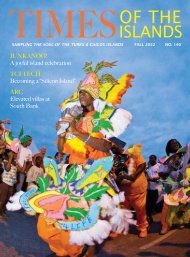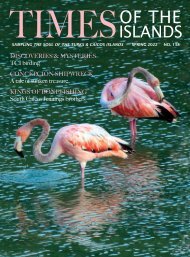Times of the Islands Spring 2020
Presents the "soul of the Turks & Caicos Islands" with in-depth features about local people, culture, history, environment, businesses, resorts, restaurants and activities.
Presents the "soul of the Turks & Caicos Islands" with in-depth features about local people, culture, history, environment, businesses, resorts, restaurants and activities.
You also want an ePaper? Increase the reach of your titles
YUMPU automatically turns print PDFs into web optimized ePapers that Google loves.
YALE UNIVERSITY PRESS<br />
against slaves, which historian Trevor Burnard called<br />
“sociopathic,” a term which could perhaps be applied to<br />
most slaveholders, including many on Grand Caicos.<br />
In a twisted but not uncommon way, Thistlewood<br />
also developed an affection for a few <strong>of</strong> <strong>the</strong> slave women.<br />
One woman in particular named Phibbah, with whom he<br />
had a son, apparently used his emotional connection to<br />
her (perhaps dependency mixed with jealousy) to turn<br />
<strong>the</strong> tables and gain favors to survive in an o<strong>the</strong>rwise<br />
oppressive society. Phibbah even felt free to quarrel with<br />
Thistlewood and refuse to sleep with him without fear <strong>of</strong><br />
repercussion.<br />
This brings us to <strong>the</strong> intriguing relationship between<br />
Dr. John Lorimer and his slave Rose on his Haulover<br />
Estate in Middle Caicos. Lorimer’s will, written in 1807,<br />
has been recorded as stating that on his death he would<br />
free all <strong>of</strong> his slaves. In fact, according to Mr. Sadler,<br />
<strong>the</strong> will was mistakenly recorded because Lorimer freed<br />
only one slave, referred to as his “faithful Negro woman<br />
slave Rose.” Rose first appears as “Rosana, property <strong>of</strong><br />
John Lorimer Esq. born April 16th, 1795” and baptized in<br />
March 1800 in Grand Turk when Lorimer was <strong>the</strong>re acting<br />
as <strong>the</strong> King’s Agent. Apparently, Rose is <strong>the</strong> only one <strong>of</strong><br />
his slaves to be baptized, which raises <strong>the</strong> question <strong>of</strong>,<br />
“Why her?”<br />
The details <strong>of</strong> Lorimer’s will provide some context:<br />
“I wish my body to be carried to <strong>the</strong> grave by six <strong>of</strong> my<br />
Negroes (if I have any) dressed in white. For long service<br />
rendered me by <strong>the</strong> Negro woman Rose, I leave her free<br />
. . . [and] leave Rose any two <strong>of</strong> my young Negroes born<br />
and raised in <strong>the</strong> Caicos and Turks <strong>Islands</strong>, which she may<br />
choose.” Rose is later mentioned in an 1822 slave register<br />
as, “Rose Lorimer, free black woman” who owns two<br />
slaves, “Joe, male 30, Black. Turks <strong>Islands</strong> and Hannah,<br />
female, 30, Black. Turks <strong>Islands</strong>.”<br />
So it appears that Rose is free and has two slaves <strong>of</strong><br />
her own, a rare gift for a former slave, which suggests a<br />
special relationship with Lorimer <strong>of</strong> some kind. It is telling<br />
that Rose is already referred to in Lorimer’s 1807 will as<br />
“faithful Negro woman,” and on track to be freed even<br />
though at <strong>the</strong> time she was only 12 years old (if she was in<br />
fact born in 1795 per <strong>the</strong> Grand Turk records). While not<br />
definitive, <strong>the</strong> shards <strong>of</strong> evidence seem to indicate that<br />
Rose is his daughter, prompting, <strong>of</strong> course, <strong>the</strong> second<br />
question about his relationship with Rose’s mo<strong>the</strong>r, most<br />
likely a slave under his control.<br />
By singling out Rose in granting her freedom and<br />
slaves, Lorimer ensured she would have far greater independence<br />
and a higher level <strong>of</strong> comfort in life. One can try<br />
to portray this act <strong>of</strong> kindness as a slaveholder’s “s<strong>of</strong>ter”<br />
<strong>Times</strong> <strong>of</strong> <strong>the</strong> <strong>Islands</strong> <strong>Spring</strong> <strong>2020</strong> 51

















